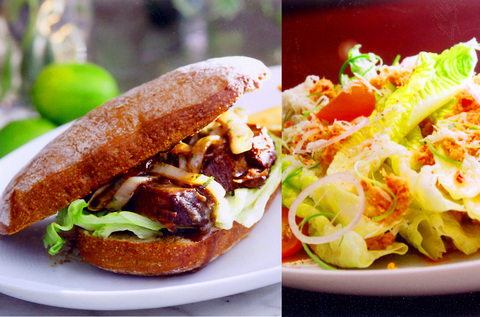Cheers inside the Grand Hyatt has been feeding casual diners and irrigating business travelers for 16 years. That's an eternity in the life of a Taipei bar and restaurant; and the feel of this one had grown a bit dated, even if its location in a five-star hotel between the World Trade Center and Taipei 101 always guaranteed a steady stream of new faces.
So Cheers took a six-week vacation and emerged last Saturday with a new theme, a new look and a new menu. The aim was to change things just enough to appeal to a younger clientele without scaring away the old customers. The result was described in a press release handed to journalists at a preview lunch as “casual yet loungy, designed yet homey, contemporary yet classic” — and that's a fairly accurate assessment.
“We've been working on this for a long time. This was one of the final projects to accomplish the renovation of the (hotel's) food and beverage operation,” said Olivier Lenoir, food and beverage director at the Grand Hyatt Taipei. He felt “it came out really nice. Very fresh but not too modern.”

PHOTO COURTESY OF GRAND HYATT TAIPEI
The concept behind the redesign is “East meets West.” For the food this means a multicultural blend, not California-style fusion, with selections as diverse as Taiwanese beef noodle soup (NT$420) and Western sandwiches like the croque monsieur (NT$420) and steak sandwich “poor boy” on sourdough loaf (NT$460).
Asian elements predominate in the interior design, with maple and blood-wash finishes, red pillows on couches, and the use of rice paper in a textured arch behind the bar so that that it doesn't stand out during the daytime. Designer Celia Chu (朱怡芬) also made the bar narrower, she said, to encourage conversation between patrons and bartenders.
The changes are likely to disrupt the patterns of longtime guests only in a good way, as the layout and mood remain largely the same. In addition to sampling new items on the menu, other reasons to rediscover Cheers include plush booth seating along the walls and a new outdoor terrace.
Business travelers who find themselves disoriented by Cheers' new look will quickly find their bearings when presented with the drink menu, which now includes more than 40 single malts (NT$300 to NT$1,200 per glass). And smokers can still light up in Cheers, the only bar or restaurant inside the Grand Hyatt where this is still allowed.

From the last quarter of 2001, research shows that real housing prices nearly tripled (before a 2012 law to enforce housing price registration, researchers tracked a few large real estate firms to estimate housing price behavior). Incomes have not kept pace, though this has not yet led to defaults. Instead, an increasing chunk of household income goes to mortgage payments. This suggests that even if incomes grow, the mortgage squeeze will still make voters feel like their paychecks won’t stretch to cover expenses. The housing price rises in the last two decades are now driving higher rents. The rental market

July 21 to July 27 If the “Taiwan Independence Association” (TIA) incident had happened four years earlier, it probably wouldn’t have caused much of an uproar. But the arrest of four young suspected independence activists in the early hours of May 9, 1991, sparked outrage, with many denouncing it as a return to the White Terror — a time when anyone could be detained for suspected seditious activity. Not only had martial law been lifted in 1987, just days earlier on May 1, the government had abolished the Temporary Provisions Effective During the Period of National Mobilization for Suppression of the Communist

Hualien lawmaker Fu Kun-chi (傅?萁) is the prime target of the recall campaigns. They want to bring him and everything he represents crashing down. This is an existential test for Fu and a critical symbolic test for the campaigners. It is also a crucial test for both the Chinese Nationalist Party (KMT) and a personal one for party Chairman Eric Chu (朱立倫). Why is Fu such a lightning rod? LOCAL LORD At the dawn of the 2020s, Fu, running as an independent candidate, beat incumbent Democratic Progressive Party (DPP) lawmaker Hsiao Bi-khim (蕭美琴) and a KMT candidate to return to the legislature representing

Fifty-five years ago, a .25-caliber Beretta fired in the revolving door of New York’s Plaza Hotel set Taiwan on an unexpected path to democracy. As Chinese military incursions intensify today, a new documentary, When the Spring Rain Falls (春雨424), revisits that 1970 assassination attempt on then-vice premier Chiang Ching-kuo (蔣經國). Director Sylvia Feng (馮賢賢) raises the question Taiwan faces under existential threat: “How do we safeguard our fragile democracy and precious freedom?” ASSASSINATION After its retreat to Taiwan in 1949, the Chinese Nationalist Party (KMT) regime under Chiang Kai-shek (蔣介石) imposed a ruthless military rule, crushing democratic aspirations and kidnapping dissidents from